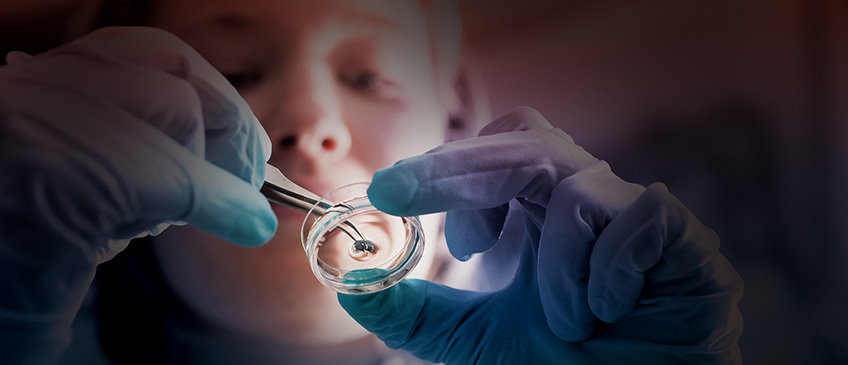Masterstudiengang Matter to Life
Der Begriff Matter to Life beschreibt ein Themenfeld des Bioengineerings, das sich besonders in den letzten Jahren rasant entwickelt hat. Ganz generell beschäftigt sich das Feld damit, biologische Systeme im Nanobereich explorativ zu erforschen und sich dabei der Frage zu nähern, wie das Zusammenspiel biologischer Bausteine Leben ausmacht und wie man lebensähnliche Systeme replizieren könnte. Matter to Life ist ein multidisziplinäres Feld, in dem die Grenzen wissenschaftlicher Disziplinen immer wieder gezielt überschritten werden, um neue Erkenntnisse für die Grundlagenforschung, aber auch neue Anwendungen möglich zu machen.
Ziel des Studiengangs Matter to Life ist es, innovative und kreative Erfinder auszubilden, die neue Technologien und unbekannte Themenfelder in einem explorativen Learning-by-Doing-Ansatz kombinieren und kreativ mit biologischen Substanzen umgehen, um neue Erkenntnisse zu gewinnen und Anwendungen im Bereich der Lebenswissenschaften zu schaffen.

Diese Seite gibt einen Überblick über das Curriculum im Masterstudiengang Matter to Life und verlinkt aktuelle Informationen für Studierende. Studieninteressierte finden detaillierte Informationen zu dem Studiengan in der ausführlichen Beschreibung.
Curriculum
Dieser interdisziplinäre Masterstudiengang ist so strukturiert, dass im ersten Studienjahr hauptsächlich Vorlesungen und Praktika besucht werden, während sich das zweite Jahr auf die Forschung im Rahmen der Masterarbeit fokussiert.
Curriculum
7. und 8. Semester - erstes Studienjahr
| Module | Umfang |
|---|---|
| PH2228 Synthetische Biologie 1 | 5 CP |
| Exploratives Forschen | 18 CP |
| Wahlmodul Ethik | 2 CP |
| Wahlmodule Naturwissenschaften | 35 CP |
9. und 10. Semester - zweites Studienjahr
| Module | Umfang |
|---|---|
| Kollaboratives Forschungspraktikum | 30 CP |
Masterarbeit
|
30 CP |
Im ersten Jahr werden Vorlesungen aus dem Pflicht- und Wahlmodulkatalog besucht. Die Wahlfachmodule behandeln ausgewählte Themen aus dem Bereich des Matter to Life und führen an die aktuelle Forschung heran. Das zweite Jahr ist sehr forschungsnah gestaltet und teilt sich auf in Lab Rotation und eine Forschungsarbeit die in einer Masterarbeit mündet.
Der Masterstudiengang ist ein konsekutiver, viersemestriger Studiengang, der jährlich im Wintersemester begonnen werden kann. Die Zulassung zum Studiengang erfolgt über ein Eignungsverfahren.
Ziel des Studiengangs ist es, das eigenständige und kreative Denken der Studierenden zu fördern. Im Bereich Matter to Life kann dieses Wissen am besten in einem Learning-by-Doing Ansatz direkt an der Laborbank während der Bearbeitung einer wissenschaftlichen Fragestellung vermittelt werden. Der Anteil an Modulen, die praktisches Arbeiten im Labor vorsehen, zusätzlich zu Grundwissen-vermittelnden Vorlesungen, umfasst deswegen mit insgesamt 78 Credits 65 Prozent der gesamten Leistungen.
Um zunächst mit dem explorativen Forschen vertraut zu werden, bringen die Studierenden in den ersten beiden Semestern 18 Credits für das praktische Modul Matter to Life: Exploratives Forschen ein. Dieses neu konzipierte Modul hat das Ziel, die Studierenden in ihrer Eigeninitiative für kreatives Herangehen an wissenschaftliche Fragestellungen zu bestärken. Gruppen aus drei bis vier Personen über den Zeitraum von zwei Semestern erarbeiten flexibel ein Forschungsproposal aus dem Bereich Matter to Life. Hierbei sind die Gruppen selbst an der Formulierung der eigenen Themenstellung beteiligt, die generell so gewählt ist, dass ein exploratives Vorgehen notwendig ist um sich dem Thema zu nähern. Die Themen greifen aktuelle Entwicklungen des Gebiets Matter to Life auf und formulieren innovative Ideen für neue Anwendungen.
„Direct Track“: Durchstarten aus dem Masterstudium zur Promotion
Für herausragende Studierende eröffnet sich ein direkter Übergang zur Promotion, indem die Forschungsphase des Studiums nahtlos in einem Promotionsprojekt fortgeführt wird. Sie können bereits während der Forschungsphase Mitglied im Graduiertenzentrum Physik werden und an Teilen des Qualifizierungsprogramms der TUM Graduate School teilnehmen.